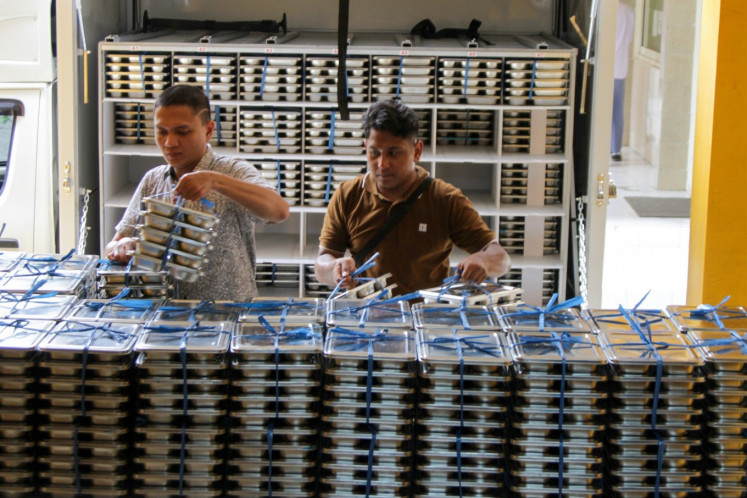Djohan Effendi’s legacy must live on: Minority groups
Djohan Effendi (Kompas)For Indonesia’s religious minority and native faith groups, the late Muslim intellectual Djohan Effendi was a true pluralism figure, who tirelessly fought to defend their right to exercise their beliefs amid state-sponsored discrimination and intolerance against them
Change text size
Gift Premium Articles
to Anyone

Djohan Effendi (Kompas)
For Indonesia’s religious minority and native faith groups, the late Muslim intellectual Djohan Effendi was a true pluralism figure, who tirelessly fought to defend their right to exercise their beliefs amid state-sponsored discrimination and intolerance against them.
Such was the message delivered by Dewi Kanti, an adherent of the Sunda Wiwitan native faith from West Java, when she took to the stage and sang a Sundanese ballad entitled “Pesan Bintang” (Message of the Star), a song dedicated to Djohan during a memorial event for him on Wednesday.
“The philosophy of this song is that humans should learn from the star that provides light in the dark […] For us, Djohan Effendi was our star; a figure who gave his all to provide strength and support for those who were weak,” Dewi told The Jakarta Post on the sidelines of the event.
In 1999, it was Djohan, in his capacity as the head of the Research and Development Center at the Religious Affairs Ministry, who finally opened the door for the Sunda Wiwitan community to conduct Seren Taun, a traditional ceremony to honor rice goddess Sanghyang Sri, for the first time in 17 years.
During Soeharto’s New Order regime, the Sunda Wiwitan group was prohibited from celebrating Seren Taun, since it was considered to be religious heresy. Djohan attended the ceremony in 1999, which led to closer cooperation between Djohan and the native faith group in promoting minority rights.
“Before he went to Australia, my father gave [Djohan] a traditional headband, and he was still wearing it up until his last birthday in October last year,” the 42-year-old woman recalled.
Dewi was among dozens of native faith and religious groups, and hundreds of attendees, who came to Djohan’s memorial event, which was held 40 days after he passed away due to illness on
Nov. 17 last year in Geelong, Australia. He was 78 years old.
A defender of human rights, Djohan was known for his bravery in standing up for minority groups, including the Ahmadiyah group, Shiite Muslims as well as native faith sects, and voiced his opposition to the discrimination and injustice against them.
Djohan, who served as state secretary under former President Abdurrahman “Gus Dur” Wahid’s administration, was also a pioneer of interfaith dialogue since the early 1970s. He had co-founded several interfaith organizations, including Dian Interfidei and the Indonesian Conference for Religions and Peace (ICRP).
His commitment to promoting religious diversity and tolerance made him one of the towering figures in contemporary Indonesian Islamic thought along with Gus Dur, Nurcholis “Cak Nur” Madjid and Ahmad Wahib. The figures were listed among “50 Liberal Figures in Indonesia” under the category of liberal Islam movement pioneers.
The similarity between the four was that they did not use Islam as a political ideology, and their vision was in line with state ideology Pancasila, which served as the meeting point for diverse elements in the nation, Siti Musdah Mulia, a pluralism figure and ICRP foundation chairman said.
“Even as a civil servant, [Djohan] was brave to voice arguments that were different from those of mainstream Muslims. His bravery has inspired many young people, including myself,” Siti, also a close colleague of Djohan, said.
She went on to say that Djohan’s thoughts on religion and its relation to the nation should be preserved, including his warning that people should not let religion be manipulated as an alternative ideology and used as a tool of power and politics.
“This thought is really relevant especially for 2018, which has been called a political year, during which religion could become a political commodity that can be easily sold,” Siti said, referring to the upcoming simultaneous regional elections.
Similarly, Indonesian Communion of Churches (PGI) general-secretary Gomar Gultom said Djohan’s legacy should be continued by other civil servants and bureaucrats, who should treat every citizen from all religious and native faith backgrounds equally, as required by the 1945 Constitution.
During his time as state secretary minister, Djohan listened to the aspirations of minority groups, ranging from Parmalim in North Sumatra to Shih followers, and fought for them, Gultom said.
“All public officials in the nation should follow [Djohan] and be present for people from all religions, including those whose beliefs are not recognized by the state,” Gultom told the Post.
“Djohan’s thoughts and values should live on in our daily lives to build the nation. Our diversity is a given; it should not be seen as a threat, but instead as a gift from God,” he added.









